Connecting state and local government leaders
“There are a lot of engineers and architects … who are willing to come out and volunteer,” according to Jonathan C. Siu, Seattle’s principal building official.
SEATTLE — When a major natural disaster strikes, police, firefighters and emergency medical personnel are usually the types of first responders that the public thinks about, well, first. They’re the ones who come to the rescue in communities facing emergencies.
But there are also second and third responders, those who support first responders but have their own critical roles in disaster recovery work. In a flood, storm or earthquake, that includes building inspectors, civil engineers, architects and others who have the technical skills and training to assess whether a structure is safe to reoccupy or whether it should be red-tagged and declared off limits.
The challenge is that in an especially large disaster, like a regionally disruptive earthquake, there aren’t enough local building inspectors who can do that vital post-quake assessment work. But that doesn’t mean there aren’t other resources officials can lean on in such an emergency.
“There are a lot of engineers and architects … who are willing to come out and volunteer,” said Jonathan C. Siu, the principal engineer and building official with the Seattle Department of Construction and Inspections.
Siu is a founding member of Safety Assessment Facilities Evaluators in Washington state, better known as WAsafe. That group assists building officials with safety assessments following an earthquake, flood or storm by developing and maintaining a roll of qualified volunteers and providing ongoing training for post-disaster recovery work.
Also involved in WAsafe are the Washington state chapter of the American Institute of Architects, the American Society of Civil Engineers, the Structural Engineers Association of Washington, the Washington Association of Building Officials and the Washington state Department of Health.
California has a similar program.
During a presentation before the National Earthquake Program Managers annual meeting in Seattle on Tuesday, Siu discussed how daunting building inspections can be following a big earthquake. After the Loma Prieta quake in 1989, Siu said San Francisco had 30 building inspectors and 15 engineers to inspect 150,000 buildings that were impacted by the magnitude 6.9 seismic event.
Following the magnitude 6.7 Northridge quake in 1994, building inspectors in Los Angeles faced similar challenges. In all, Siu said, there were 7,000 buildings that were severely damaged and unsafe to occupy; 22,000 buildings were moderately damaged and their use was restricted.
In 2001, it was Washington state’s turn with the magnitude 6.8 Nisqually quake centered near Olympia. And while that seismic event, thanks to its depth, didn’t do much damage compared to the Loma Prieta and Northridge quakes in California, Siu said the need for qualified inspectors is still great.
“Even in a small response, we’re still going to need help,” he said.
While building a group of trained volunteers at the ready to respond to the next major quake is one thing, deploying them during a real disaster is an entirely different challenge. That’s especially true for something like the next Cascadia Subduction Zone megaquake and tsunami in the Pacific Northwest, which is expected to cripple transportation, communications and other infrastructure networks across the region whenever it strikes next.
Assuming that the state’s volunteer building inspectors can be assembled and be dispatched in short order after a major quake, Siu posed an important question: “If I’m a volunteer, how does the building inspector know where to send me?”
He explained that volunteers are deployed according to five different types of buildings, each type requiring certain levels of experience and professional certification. Generally, following a major earthquake, those with higher levels of certification and experience are dispatched to vital facilities or more difficult-to-assess building types, such as hospitals. Those with lower levels of certification or experience assess less complex structures, like single-family, wood-frame homes.
As Siu explained, volunteer inspectors don’t simply swarm and start assessing buildings. There’s a chain of events and decisions, as laid out in a memorandum of understanding with the state.
The event, like a major earthquake, triggers local response and mutual aid agreements.
A local building official requests additional resources through the local emergency operations center. The local EOC then sends the request to the county. If the county can’t act on that request, it's forwarded to the state. The state initiates contact with WASafe, which compiles a list of volunteers, which is then sent to the state. The state then sends volunteers to requesting jurisdictions. (Siu noted that in the event of a major earthquake in western Washington, like the future Cascadia megathrust quake, WAsafe’s network east of the Cascade Range, out of the disaster zone, will help coordinate volunteers.)
Then building assessments and placarding can be commence.
That’s how it’s supposed to work, anyway.
“It’s an incredible amount of work that needs to be done,” Siu said.
The challenge, of course, is that major disasters can test operations and planning in ways that can’t always be anticipated.
Michael Grass is Executive Editor of Government Executive’s Route Fifty and is based in Seattle.

NEXT STORY: America's Opioid Crisis Is Now a Fentanyl Crisis




